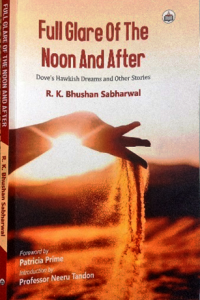Creation and Criticism
ISSN: 2455-9687
(A Quarterly International Peer-reviewed Refereed e-Journal
Devoted to English Language and Literature)
Vol. 08, Joint Issue 30 & 31: July-Oct 2023

Book Review
Full Glare of The Noon And After
by R.K. Bhushan Sabharwal
R.K. Bhushan Sabharwal. Full Glare of The Noon And After: Dove’s Hawkish Dreams and Other Stories. New Delhi: Authorspress, 2023. Pp. 110. Rs. 295/-. ISBN: 978-93-5529-689-4.
Reviewed by Sudhir K Arora
Full Glare of The Noon And After is R. K. Bhushan Sabharwal’s short story collection which reveals the existential issues and observations on life and its predicament. When the author concludes that “Life is a Theatre of the Absurd in the end” (59), he seems to be influenced by the theatre of the absurd.
Besides Patricia Prime’s “Foreword”, Neeru Tandon’s “Introduction”, T. S. Chandra Mouli’s observation, “Of Human Bonds and Harmony”, and three pre-publication reviews by Pankajam Kottarath, Shaleen Kumar Singh and T. S. Anand, this short story collection contains seven stories, titled, “Dove’s Hawkish Dreams”, “Chitra”, “Authors of Ruin”, “Kins of Craft”, “The Said Unsaid”, “Curse of the Cursed Still Born” and “Interventions.”
The author has used the metaphor of ‘noon’ in the title which appears as a line in the story “Curse of the Cursed Still Born.” Though this metaphor is used in the story for the life of Akhilesh and his blessed kids, it is almost applicable to all the stories conveying the message related to life when one’s life is in noon with its full glare and when the glare fades after noon.
“Dove’s Hawkish Dreams” reveals the intricacies of life showcasing Surinder, Varsha, and their adopted daughter Anuradha whose haughtiness brings failure in her marriage with Adarsh and her remarriage with Atulya. The author frankly offers the message that “those who are insensitive to the decencies of humanity, remain bereft of meaningful fulfilment whatever be their accomplishment” (33). The need is to accept life as it is and “enjoy its beauties with love, hope and faith” (34).
Chitra is a story of Chitra, a woman who marries, as it is destined, with Gautam who knows the mean mentality of his relatives using dirty tricks for defaming his wife. Their settling in San Francisco fails to bring the two mismatched pair together. Chitra is quite aware of this fact and so she makes up her mind to part ways in order to achieve “peace and complete harmony with herself” (41). She learns the great lesson that “The world is a big market and one may find a rich variety to one’s liking and taste and enjoy life to the full” (41). The author has also soft corner for the character in Chitra believing that “Feminine fragrances must not be wasted and crushed under any circumstances to ensure that life blossoms your aspirations and dreams” (42).
“Authors of Ruins” conveys the message that those who are considered to be ours become the real causes of suffering and ruin. Varun, the protagonist is being motivated by the wise man who asks him to “stick to values that ennoble our life” and “keep unflinching faith in the graces and blessings of the Supreme Lord to achieve some or great glory in life” (50).
“Kins of Craft” muses over selfishness of relations while “The Said Unsaid” explores the ways of saying and reflecting with the message that “courage under suffering is endurance; this is the silence of strength” (64). “The Curse of the Cursed Still Born” narrates the tragedy of Akhilesh’s married life with the eccentric Sharmishtha. “Interventions”, as the title suggests, seems to be author’s intervention as he starts more pondering over life than narrating the story. For him the worst enemies of happiness are “not gods, but humans close and trusted among important relations in daily life” (83) and bliss of life can be “experienced only in Lord Krishna’s message of non-attachment” (82).
The author appears to be more a moraliser than a story teller. In every story his ‘presence in absence’ can be felt when he moralises and offers practical observations related to his experiences on life. For instances:
Whenever you feel that your freedom, dignity and self-respect are at stake, don’t share your mind with anybody and everybody. (42)
The world always pounces upon those who allow themselves to be cheated and looted leaving the protagonist to his crushed self. (61)
One’s honest efforts, howsoever hard, yield good results for happy times ahead. (77-78)
What makes the story collection striking is the author’s use of poetic words, images and figures. His presentation of Chitra proves his craft.
Chitra was truly a Chitra, a moving and living image of beauty and enchantment, a speaking picture of ideal woman and a talking portrait of future embroidered in colourful delicacy. (35)
When the reader starts reading the first page, he begins to lose in the web of words. The moment he comes to the last page, he becomes mature enough to experience and say that “Today we see everybody cares and lives for his or her own existential issues. This is the religion of daily life” (91). Along with this, he also learns the art of balancing life and thus comes out with this determination of participation in the ETERNAL FLOW of life to the extent that he begins to share with others “the blissfulness of life” saying “Let’s love it and live it” (59).
In brief, Full Glare of The Noon And After is a mature short story collection meant for a mature reader who may find the depiction of life and its predicament. A reader who is in search of a story line will be disenchanted, but if he is interested in existentialism and theatre of the absurd, he will feel rewarded and thankful to the author.
About the Reviewer:
 Dr Sudhir K. Arora, the Editor-in-Chief of Creation and Criticism, currently holds the position of Professor of English at Maharaja Harishchandra P. G. College in Moradabad, affiliated to M. J. P. Rohilkhand University, Bareilly, India. He has authored several significant publications, including Aravind Adiga’s The White Tiger: A Freakish Booker and Cultural and Philosophical Reflections in Indian Poetry in English in Five Volumes. He can be reached at drsudhirkarora@gmail.com.
Dr Sudhir K. Arora, the Editor-in-Chief of Creation and Criticism, currently holds the position of Professor of English at Maharaja Harishchandra P. G. College in Moradabad, affiliated to M. J. P. Rohilkhand University, Bareilly, India. He has authored several significant publications, including Aravind Adiga’s The White Tiger: A Freakish Booker and Cultural and Philosophical Reflections in Indian Poetry in English in Five Volumes. He can be reached at drsudhirkarora@gmail.com.


